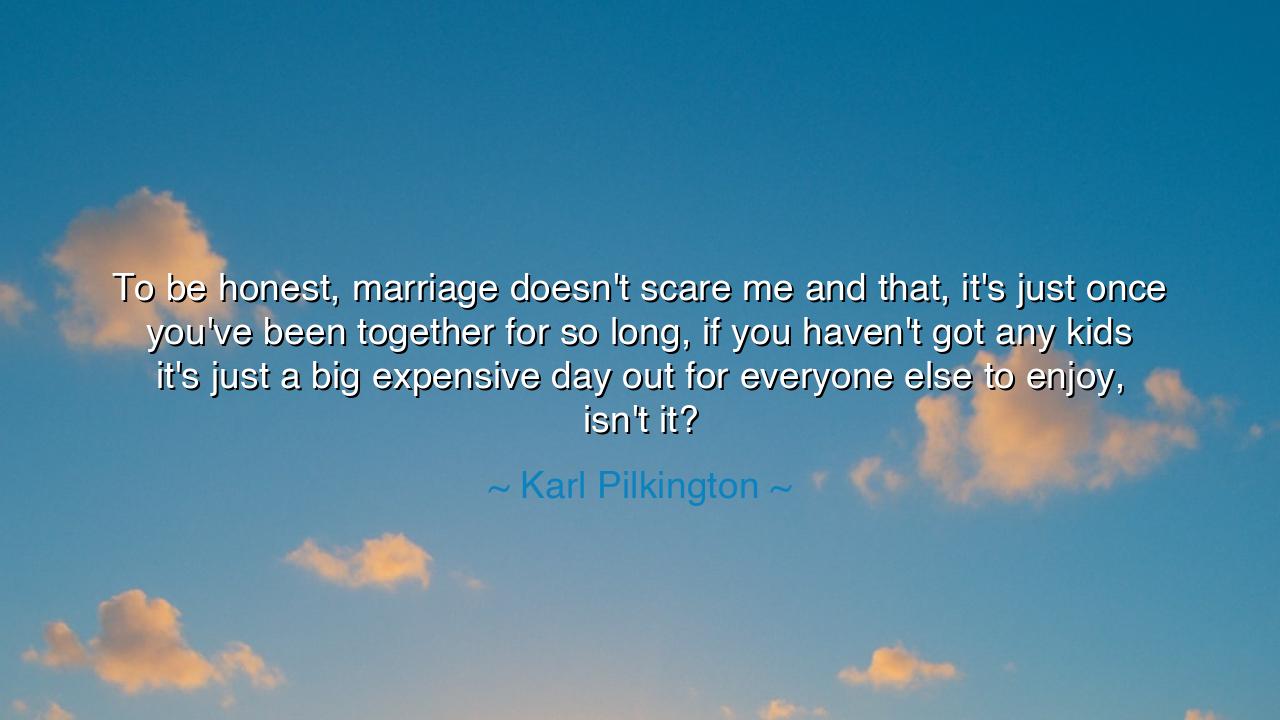
To be honest, marriage doesn't scare me and that, it's just once
To be honest, marriage doesn't scare me and that, it's just once you've been together for so long, if you haven't got any kids it's just a big expensive day out for everyone else to enjoy, isn't it?






In the words of Karl Pilkington, we find a curious mixture of humor and profound truth: “To be honest, marriage doesn't scare me and that, it's just once you've been together for so long, if you haven't got any kids it's just a big expensive day out for everyone else to enjoy, isn't it?” This saying, though wrapped in casual wit, speaks with the tongue of an ancient philosopher disguised as a fool. For within its jest lies a meditation on love, commitment, and the meaning of ceremony—questions that have echoed since the dawn of civilization.
In the old days, when tribes gathered by the fire and gods were carved in stone, marriage was not merely a ritual—it was a covenant between souls and families, a bond that joined destinies. Yet as time passed and the fires turned to candles and chandeliers, men began to adorn the union with gold and spectacle. The heart of the matter dimmed beneath the weight of silk and cost. Pilkington, in his blunt northern way, strips away this illusion and reminds us that the sacred is not in the feast, nor in the applause of others, but in the quiet companionship that precedes and follows the day itself.
Consider the tale of Marcus Aurelius, Emperor of Rome, who ruled not only with strength but with stoic grace. When his beloved wife Faustina passed, he did not build temples of excess, though the empire could have afforded ten thousand. Instead, he wrote in his private meditations that “to love but once, to share the same vision of life, is victory enough.” He understood that love’s worth lies not in display, but in endurance—that the union of two souls is a sacred dialogue, not a performance. Karl’s words echo this same sentiment, hidden beneath laughter: that the essence of partnership is already complete before the wedding bells ever ring.
In another sense, the quote reveals a modern weariness—a recognition that the world mistakes celebration for meaning. We live in an age where love must be declared on stages, shared through images, and witnessed by many to seem real. Pilkington questions this illusion. If two have walked through the long seasons of life together—through winter and spring, through hunger and health—what need have they for public proof? The bond of shared time itself is marriage; the ceremony is but a shadow of the real thing.
Yet there is also tenderness in his words. He does not scorn marriage; he merely strips it of its fear and pretense. “Marriage doesn't scare me,” he says, as if to tell us that love, when true, has nothing to fear. What he fears instead is emptiness disguised as grandeur, the hollow joy of a day meant more for others than for the two it was meant to honor. In this we see wisdom—an urging to find sincerity before spectacle, simplicity before splendor.
Let us then take heed of his jest. For what use is a wedding that pleases all but the lovers themselves? What good is a feast that ends in loneliness, a promise spoken for the crowd and not the heart? The ancients would tell us: celebrate less, live more. A single act of quiet devotion—a shared meal, a day spent in laughter, a promise whispered beneath the stars—holds more holiness than the loudest of ceremonies.
The lesson, then, is clear: do not mistake ritual for relationship. Love does not begin at the altar, nor end at the banquet. It is woven in the days before and after—the small kindnesses, the enduring patience, the laughter shared over the years. If ever you are to wed, let it not be for the spectacle of others, but for the deep truth of your own bond. And if you do not wed, but love truly, then you have already lived the spirit of marriage itself.
So walk gently in love, and let your commitment be a quiet fire, not a fleeting flame. For when the music fades and the guests depart, it is not the day that endures, but the hearts that remain. Let the world enjoy its big expensive day out—but let your joy be the kind that no one else need witness.






AAdministratorAdministrator
Welcome, honored guests. Please leave a comment, we will respond soon